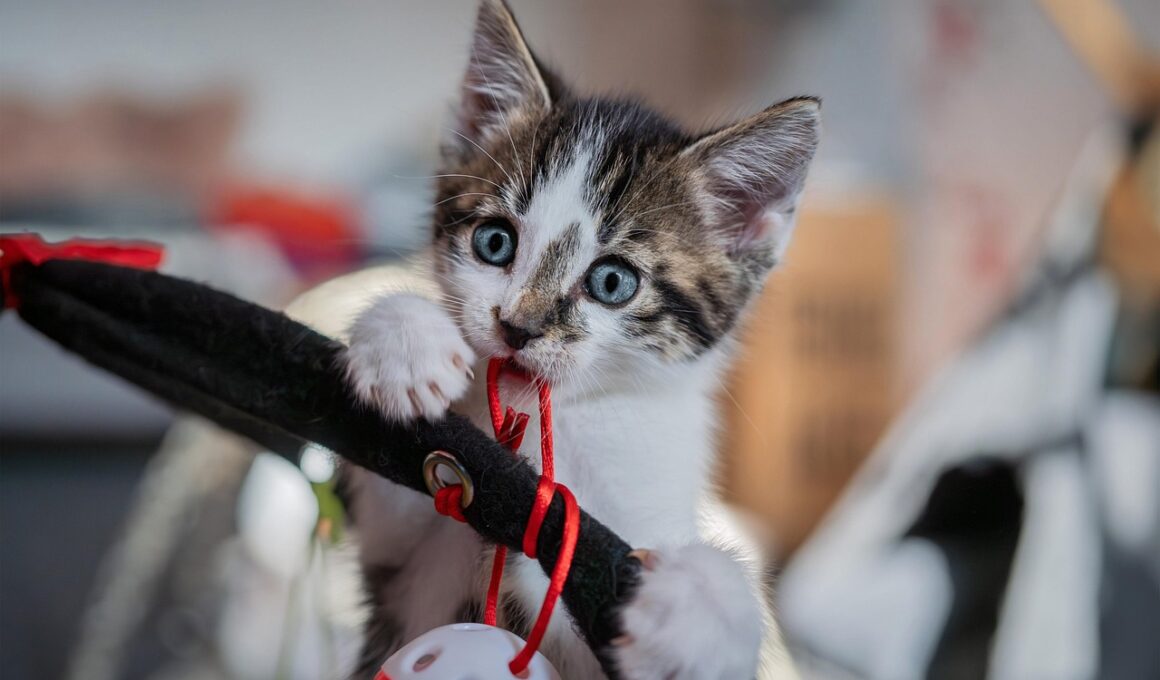How Kittens Learn Through Play
Play is vital for kittens, as it facilitates learning about their environment and social skills. During play, kittens engage in behaviors that mimic hunting, such as stalking, pouncing, and ambushing. This practice is not merely entertaining; it equips them with the necessary skills for survival. Through these activities, kittens also learn to interact with their littermates, becoming more adept at socialization. When kittens are in a playful mood, you might observe them chasing imaginary prey, pouncing on toys, or even wrestling with their siblings. Each of these actions helps them improve their agility and coordination. Kittens who play regularly develop stronger muscles and better overall health. Engaging with their surroundings develops their senses, teaching them to identify different textures, sounds, and movements. They often use simple household items as toys, and owners should provide safe alternatives such as feather wands or balls. Additionally, interactive play between kittens and humans fosters trust and affection. This bonding time is essential for their emotional well-being and helps them form strong attachments. Ultimately, the importance of play cannot be overstated, as it establishes a foundation for a happy, healthy cat.
Understanding kitten play behavior is essential for cat owners. Kittens often engage in play fighting, which serves multiple purposes. Firstly, it mimics predatory behavior, allowing them to practice essential hunting skills. The use of claws during play is not meant to harm their peers but to help them learn to control their strength. This inner development will be critical as they grow older, increasing their confidence in social interactions. Additionally, play fighting allows kittens to establish boundaries, learning when to retreat or challenge another competing kitten. Owners can witness these playful bouts, often marked by touches of gentleness and aggression, signaling their growing confidence. Cats also practice vocalizations during play, helping develop their ability to communicate effectively with their peers and humans. Another important aspect is their keen observation of each other’s cues, learning social rules through interaction. Kittens who grow up playing with littermates usually exhibit more refined social skills. Single kittens require encouragement from their human caregivers to ensure they receive the social stimulation they typically gain from their littermates. Providing opportunities for facilitated playtime helps counteract loneliness and reinforces positive behaviors.
Physical benefits derived from playtime are notable. Kittens are known for their high energy levels and curiosity; engaging in play can help expend this energy healthily. Active play promotes muscle growth and coordination, essential for a kitten’s motor skill development. Additionally, physical activity is crucial for maintaining a healthy weight, particularly since obesity can lead to various health issues later in life. Kittens engage in multiple forms of play that can include chasing balls, climbing on cat trees, or investigating interactive toys. Play not only provides physical stimulation but also satisfies mental curiosity, preventing boredom. A bored kitten might resort to undesirable behaviors, such as scratching furniture or chewing on electrical cords. Owners can combat this through thoughtful play strategies, ensuring their kittens are engaged with various toys. Additionally, incorporating short training sessions during play helps reinforce good behavior and teaches new tricks. Play also stimulates the production of serotonin, promoting peaceful behavior. All these factors contribute to a kitten’s well-being, ensuring that they grow into balanced adults. Owners should not underestimate the significance of providing a rich play environment full of diverse activities.
The Role of Interaction in Kittens’ Play
Interaction plays a significant role in how kittens develop through play. Kittens not only learn important hunting skills from their toys but also from their human companions. Engaging with pet owners fosters their bond, allowing for positive experiences that help with emotional growth. When humans participate in play, they introduce new movements and sounds that stimulate the kitten’s natural instincts. This interactive playtime is essential; it teaches the kitten how to respect boundaries and understand cues from their owners. Furthermore, interactive play enhances a kitten’s confidence as they learn to trust their humans, setting a precedent for future interactions. Kittens thrive in environments where play is enriched by human involvement. Owners should be mindful to rotate toys, provide novel experiences, and schedule regular play sessions. These interactions can focus on utilizing toys that mimic prey, such as feathers or small bells, to heighten the kitten’s excitement. Another vital aspect during play is to supervise and redirect any overly aggressive behavior. Playtime should remain fun; this helps instill positive habits and behaviors in the growing kitten. Ultimately, building a collaborative play environment is essential for healthy development.
Moreover, the types of kitten play have transformative effects on behavior. Different play styles can indicate personality traits; some kittens may prefer solitary play, while others thrive in social interactions. Observing these preferences enables owners to tailor their approach to each individual kitten. Engaging with a kitten’s preferred play style is essential to building a trusting relationship and ensuring optimal emotional development. Many kittens enjoy exploring their environment, often playing with everyday objects they encounter. Owners should provide a safe play area where kittens can engage freely, introducing a variety of interactive toys. Creating dynamic play sessions can enhance their emotional development, offering outlets for pent-up energy. Kittens involved in social play demonstrate a willingness to engage with others, indicating an outgoing nature. Conversely, solitary players may need additional encouragement, such as gradual introductions to new toys or environments. Observing responses during play can provide insight into how best to support their growth. It’s also crucial to remember that play should remain enjoyable; if a kitten shows disinterest, it may need a change in stimulation or toy type. This adaptability is fundamental in nurturing a kitten’s development.
Significance of Safe Play Environments
Creating a safe play environment is crucial for a kitten’s health and well-being. A safe space allows kittens to explore, learn, and engage without fear of injury. Owners should ensure that hazardous items, such as sharp objects, toxic plants, and electrical cords, are stored away from their playful reach. Additionally, sharp corners and high places can pose risks for curious kittens; therefore, kitten-proofing the home is essential. Play zones should include soft surfaces to reduce injury risks during rough play. If possible, owners can designate a specific area for play filled with stimulating toys that encourage exploratory behavior. Providing a variety of textures also enhances their sensory experience. Toys like crinkle balls, stuffed mice, and feathered wands can keep a kitten entertained, sparking their predatory instincts. Supervised play is necessary for younger kittens to prevent interactions with potentially harmful objects. Owners may also consider the inclusion of other pets, ensuring that introductions between animals are gradual. A well-structured environment helps kittens adapt and gain confidence in their abilities. They learn to navigate spaces safely, ultimately establishing a sense of security as they grow into well-adjusted adult cats.
Aside from physical safety, cats need mental stimulation through play, promoting cognitive development. Providing diverse play options helps build problem-solving skills, increasing their intelligence. Engaging with interactive toys, puzzle feeders, and toys that mimic prey encourages kittens to think and strategize as they play. Mental challenges are essential for reducing anxiety and promoting healthy behaviors; kittens need not only physical play but also mental tasks to enhance their growth. Regular interaction with their owners through play fosters a healthy bond that supports emotional stability. Encouraging kittens to explore their environment with varied stimuli aids in developing their cognitive abilities. As they learn about their surroundings, they gain confidence in navigating new spaces. Owners can assist this development by introducing new toys or challenging the kittens with different activities. Regularly changing the play environment keeps their interest piqued, ensuring they remain engaged and happy. As they explore, kittens will also learn important lessons about cause and effect and resourcefulness. Playtime can serve as a teaching moment for owners to bond with their kittens while nurturing intelligent, playful companions. In summary, keep your kitten engaged through diverse play experiences that promote growth.
Conclusion: Continuous Learning Through Play
In conclusion, honing in on the importance of play is essential when it comes to kittens’ development. By engaging in consistent and meaningful play, owners can steer their kittens toward developing lifelong skills that prepare them for being well-rounded adult cats. The foundation established during play not only aids physical growth but enhances social skills, emotional health, and cognitive abilities. Owners should be attentive to their kitten’s play preferences, continually adjusting for increasing interests as they grow. Understanding and interpreting behaviors during play can help owners effectively support their kittens through their formative months. Playtime is a necessity for kittens, allowing them to learn boundaries, gain confidence, and cultivate strong relationships. Providing a stimulating environment with access to interactive toys fosters curiosity and resilience. Pet owners discussing kitten care with peers can share insights that foster better practices. Creating connections within the community allows for shared experiences and knowledge that benefit all pet owners. Ultimately, the importance of play is multifaceted; it creates a foundation for socializing, bonding, and learning that results in healthy, happy kittens. Engaging in play is not just fun; it’s paramount to developing skilled and affectionate cats.


